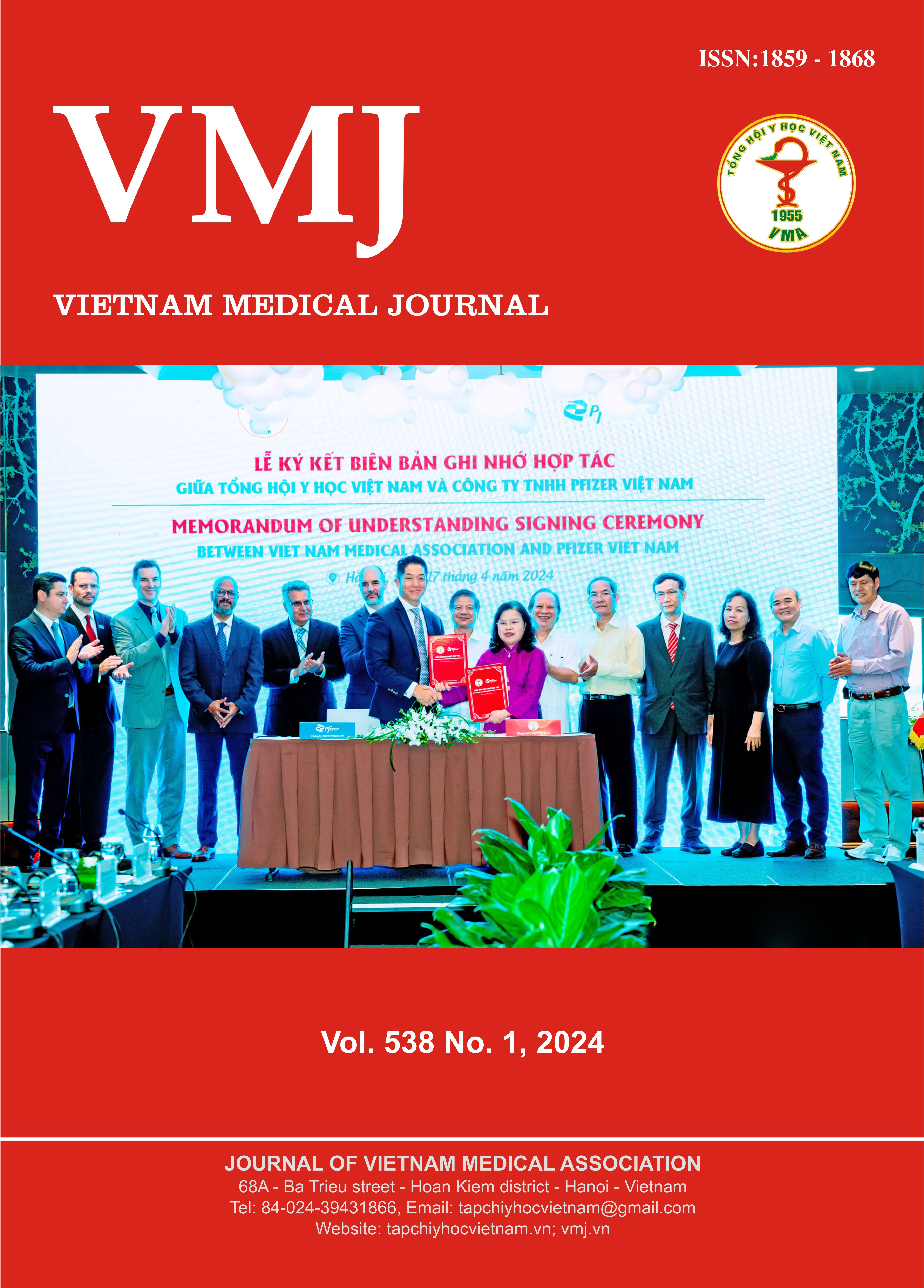THE DISTRIBUTION OF TRADITIONAL MEDICINE BODY CONSTITUTIONS AND THE FACTORS ASSOCIATED WITH DEPRESSION AMONG ELDERLY IN PATIENTS IN TRADITIONAL MEDICINE HOSPITAL OF THUA THIEN HUE
Main Article Content
Abstract
Objectives: The purpose of this study is to explore the distribution of Traditional Medicine (TM) body constitutions, examine the factors associated with depression among elderly inpatients in Traditional Medicine Hospital of Thua Thien Hue, and further contribute to enhancing the value of traditional medicine theory's quintessence in preventing depression in medical facilities and in the community. Subjects and methods: A cross-sectional study of 420 elderly inpatients in Traditional Medicine Hospital of Thua Thien Hue from July 2022 to March 2024, screening for depression, using the Geriatric Depression Scale 30 items (GDS-30) and determining the TM body constitutions, using the Constitution in Traditional Medicine questionnaire (CCMQ). The multiple logistic regression model was applied to examine the factors associated with depression. Results: The proportion of the balanced constitution was the lowest (0%). Among the unbalanced constitutions, the highest proportion was the Phlegm-dampness constitution (70.2%), followed by Qi stagnation constitution (66.9%), Yin deficiency constitution (62.6%), Blood-stasis constitution (58.3%), Qi deficiency constitution (56.6%), Dampness-heat constitution (46.9%), Inherited-special constitution (38.8%) and the lowest was Yang deficiency constitution (31.9%). The higher odds of depression were observed in Qi stagnation constitution (p < 0.001, OR = 5.787, 95%CI: 3.275 – 10.227), Qi deficiency constitution (p < 0.001, OR = 4.369, 95%CI: 2.643 – 7.222), Yang deficiency constitution (p < 0.001, OR = 3.682, 95%CI: 2.097 – 6.277), Gender (p < 0.001, OR = 3.451, 95%CI: 1.980 – 6.017), Dampness-heat constitution (p < 0.001, OR = 2.534, 95%CI: 1.545 – 4.156), Inherited-special constitution (p = 0.003, OR = 2.160, 95%CI: 1.302 – 3.584) and Yin deficiency constitution (p = 0.028, OR = 1.771, 95%CI: 1.064 – 2.948). Conclusion: This study indicated the distributions of TM body constitutions and the factors associated with depression among elderly inpatients in Traditional Medicine Hospital of Thua Thien Hue. Therefore, the assessment of the TM body constitutions contributes to the prevention strategy and early detection of depression in the health facilities as well as in the community.
Article Details
Keywords
Body constitution, Traditional medicine, depression, elderly, Constitution in Chinese Medicine Questionnaire (CCMQ)
References
2. Hua Ding Chen, Ming Zhang, Wan Zheng Qu et al. Clinical Characteristics of Senile Depression in Elderly Patients with Different Traditional Chinese Medicine Constitution and Syndrome Types in Communities. Journal of Anhui TCM Collegue. 32(2). 2013: p. 38-41.
3. Duong Thi Huong Nguyen, Thao Thu Le, Huy Khanh Tang et al. The Vietnamese version of the constitution in Chinese medicine questionnaire (CCMQ): validity and reliability. MedPharmRes. 2022. 6(2): p. 18-27. DOI: 10.32895/UMP.MPR.6.2.3
4. Nguyen Hang Nguyet Van, Nguyen Thi Khanh Huyen, Ha Ngoc Anh et al. Factors associated with depression among the elderly living in Chuong My district, Hanoi. Journal of Health and Development Studies. 2019. 3(4): p. 14-22.
5. Thong Van Nguyen, Kien Trung Nguyen, Phuong Minh Nguyen et al. Vietnamese Version of the Geriatric Depression Scale (30 Items): Translation, Cross-Cultural Adaptation, and Validation. Geriatrics. 2021. 6(4): p. 116. https://doi.org/10.3390/geriatrics6040116.
6. Khanh Vu Pham. The Geriatrics of Traditional Medicine. Viet Nam Education Publishing House. 2016: p. 23-36.
7. Fei Wang. The Geriatrics Pathology of Traditional Chinese Medicine. China Traditional Chinese Medicine Publishing House. 2017: p. 19-28.
8. Qi Wang. The Body Constitution of Traditional Chinese Medicine. China Traditional Chinese Medicine Publishing House. 2022: p.1, 134-137.
9. Sin Yee Yap, Foong Leng Ng, Menaga Subramaniam et al. Traditional Chinese Medicine Body Constitutions as Predictors for Depression: A Systematic Review and Meta-Analysis. Behavioral Sciences. 12(11). 2022. https://doi.org/10.3390/bs12110423.


